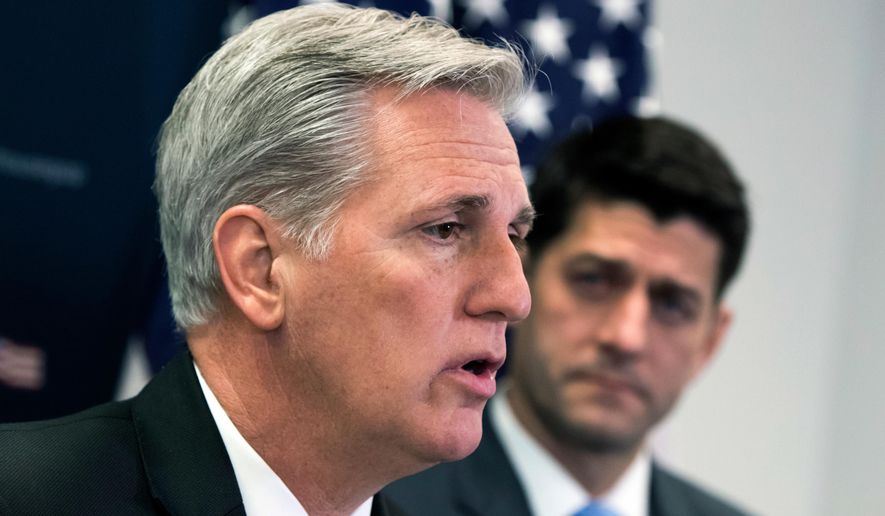House GOP leaders vowed Tuesday to speed President Trump’s new $15.4 billion spending cuts proposal through their chamber, brushing aside complaints from Democrats and some Republicans over the trims the White House wants to see.
House Majority Leader Kevin McCarthy on Tuesday predicted the House will pass the package, which includes 38 cuts to programs and generally involves money that’s sitting unused.
“If there are accounts that have been sitting there all the way back to 2011, with billions of dollars that have not been used, why do you leave them?” said Mr. McCarthy, California Republican. “Why would you let it sit there and waste and not give it back to the American public?”
Senate Republicans said they’ll take up whatever the House passes, after Majority Leader Mitch McConnell ruled that it wouldn’t breach the $300 billion spending increase agreement he reached with Democrats two months ago.
“We’ll take a look at it and see,” the Kentucky Republican said Tuesday.
The proposed rollbacks include $4.3 billion from a vehicle technology program that hasn’t made a loan in seven years, and $252 million in funding left over from the 2015 response to the Ebola outbreak.
The administration says it’s the largest single “rescissions” package a president has ever submitted. The House and Senate would need to approve the cuts on a simple majority vote to extend them beyond a 45-day window in which the spending is now frozen.
White House Budget Director Mick Mulvaney said the proposal was carefully written so it didn’t undo any of the $300 billion in spending increases Congress agreed on in March, which Democrats had said are untouchable.
“Now what are your objections? This is money that shouldn’t be spent, can’t be spent in certain circumstances, doesn’t need to be spent. What’s your argument for voting against that?” Mr. Mulvaney said.
Sen. Susan Collins, Maine Republican and a key member of the spending committee who also had expressed skepticism about rolling back parts of the spending deal, said Tuesday that the White House was moving in the right direction.
“But we still need to look at which accounts are cut and why,” said Mrs. Collins, who said she hadn’t yet had a chance to review it in detail. “Is it really unused money, or is it money that’s been obligated but not yet spent? I need more information.”
The biggest cut — about $7 billion of the $15.4 billion package — comes from the Children’s Health Insurance Program, a popular program for low-income children whose parents make too much money to qualify for Medicaid.
Democrats and some Republicans protested, saying lawmakers should be looking elsewhere if they are determined to rein in spending.
“The Republican rescissions are another cynical step in the raw deal Republicans are forcing on America’s families,” said House Minority Leader Nancy Pelosi.
But Mr. Mulvaney said the bulk of the health money is unauthorized and cannot legally be spent, and that the Department of Health and Human Services also said they didn’t need as much in a separate reimbursement fund for states as they originally thought.
“We can rescind it without affecting any programs whatsoever,” he said.
Fiscal watchdog groups gave measured praise to the effort, saying the package isn’t going to solve the country’s broader debt issue but that the president deserves credit for trying to find money the government simply doesn’t need to spend.
“Every little bit helps, and getting in the habit of supporting spending cuts without putting the money toward new policies is a step in the right direction,” said Maya MacGuineas, president of the Committee for a Responsible Federal Budget.
• David Sherfinski can be reached at dsherfinski@washingtontimes.com.




Please read our comment policy before commenting.